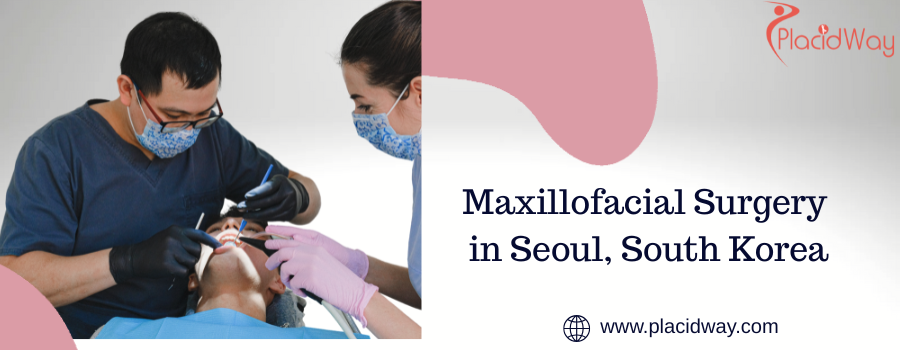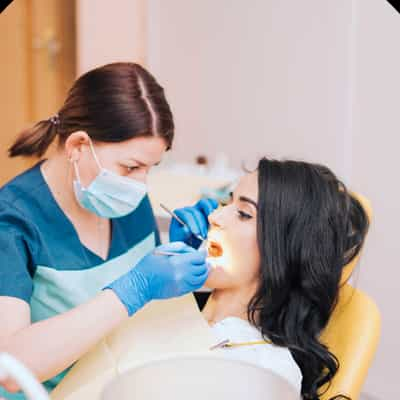Maxillofacial Surgery Price in Seoul, South Korea

Seoul, South Korea, has become a leading destination for maxillofacial surgery due to its advanced medical facilities, cutting-edge technology, and highly skilled surgeons. The city is known for its exceptional cosmetic and reconstructive surgeries, which include procedures for jaw realignment, facial trauma repair, and cosmetic facial enhancements.
Whether you're seeking corrective surgery or cosmetic enhancements to improve your facial appearance, Seoul offers some of the best options in the world, at a fraction of the cost compared to Western countries. Here’s everything you need to know about the cost of maxillofacial surgery in Seoul, what you can expect from the procedure, and why Seoul is a prime destination for medical tourism.
Key Insights at a Glance
-
Cost of Maxillofacial Surgery in Seoul: The average price for maxillofacial surgery in Seoul typically ranges from $678 to $1,000.
-
Skilled Surgeons: Seoul is home to highly experienced board-certified surgeons trained in both cosmetic and reconstructive surgery.
-
State-of-the-art Clinics: Medical facilities in Seoul are equipped with modern technologies that ensure the best outcomes for patients.
-
Cost Savings: Compared to countries like the U.S. or Europe, the cost of maxillofacial surgery in Seoul is significantly lower, offering substantial savings.
Factors Influencing the Cost of Maxillofacial Surgery in Seoul
Several factors can influence the cost of maxillofacial surgery in Seoul. These factors are important to consider when planning your procedure, as they help determine the overall expense:
1. Type of Surgery
The type of surgery you require plays a significant role in the cost. Simple procedures like minor jaw surgeries or cosmetic enhancements are less expensive than more complex procedures such as facial trauma reconstruction or orthognathic surgery (jaw realignment).
Cost Range: For minor surgeries, costs typically range from $678, while more complex procedures can cost up to $1,000 or more.
2. Surgeon’s Expertise
Experienced and well-regarded surgeons often charge more for their expertise. Surgeons with a strong track record in cosmetic and reconstructive surgery may charge higher fees, but their skill level often translates to better results and fewer complications.
3. Hospital or Clinic Reputation
Top-tier hospitals or renowned clinics that offer high-quality facilities and advanced treatment options may have a higher cost. These institutions also provide state-of-the-art technologies and comprehensive care that ensure a successful outcome.
4. Pre- and Post-operative Care
The overall cost may increase due to additional services such as pre-operative consultations, diagnostic tests, anesthesia, and post-surgery follow-up visits. Clinics that include these services in their pricing will provide a more comprehensive package.
Average Cost of Maxillofacial Surgery in Seoul
The cost of maxillofacial surgery in Seoul can vary based on the complexity of the procedure, the clinic, and the surgeon’s reputation. On average, you can expect the following prices:
| Procedure | Cost Range (USD) |
|---|---|
| Minor Maxillofacial Surgeries | $678 – $800 |
| Orthognathic (Jaw) Surgery | $800 – $1,000 |
| Facial Trauma Reconstruction | $800 – $1,000 |
| Cosmetic Facial Surgery | $700 – $1,000 |
Did You Know?
Maxillofacial surgery in Seoul can offer significant cost savings compared to other countries, with savings of up to 60-70% in comparison to prices in the U.S. or Europe.
Why Choose Seoul for Maxillofacial Surgery?
Seoul has become a global hub for medical tourism, especially for patients seeking maxillofacial surgery in Seoul. The city offers many advantages for international patients, including affordable treatment and world-class care. Here are the top reasons why you should consider maxillofacial surgery in Seoul:
1. Experienced Surgeons
Surgeons in Seoul are highly trained and skilled, with many having received advanced training in the U.S., Europe, or other leading medical centers. These professionals are experts in cosmetic and reconstructive maxillofacial surgery and are committed to providing high-quality outcomes.
2. State-of-the-Art Facilities
Seoul is known for its modern medical infrastructure. Hospitals and clinics are equipped with the latest technologies such as 3D imaging, laser surgeries, and advanced diagnostic tools, which ensure optimal results and patient safety.
3. Affordability
Compared to Western countries, the cost of maxillofacial surgery in Seoul is considerably lower, offering up to 70% savings while maintaining the highest quality standards. This makes it an attractive option for patients seeking affordable care without sacrificing excellence.
4. Quick Turnaround Time
Many clinics in Seoul offer faster scheduling and treatment plans. With shorter waiting times for consultations and surgeries, patients can plan their treatments around their schedules, making it a convenient choice for those with time constraints.
5. Medical Tourism Services
Seoul’s clinics offer tailored medical tourism packages that include services such as airport pick-up, hotel accommodations, and language assistance. These packages ensure that international patients feel comfortable and well-supported throughout their medical journey.
Additional Costs to Consider
While the cost of maxillofacial surgery in Seoul is highly competitive, there are other expenses to consider:
-
Travel Costs: Depending on your location, flights to Seoul can vary. Many international airports have direct flights to Seoul, which is easily accessible for global travelers.
-
Accommodation: Costs for staying in Seoul range from budget hotels to luxury accommodations, generally ranging from $50 to $200 per night.
-
Post-Surgery Care: Follow-up appointments may be included in the overall package, but any additional check-ups or treatments might come at an extra cost.
-
Insurance: Dental and medical insurance plans may not cover treatment in South Korea, so you’ll need to confirm with your provider or make arrangements for self-payment.
FAQs About Maxillofacial Surgery in Seoul
1. How long is the recovery time after maxillofacial surgery?
The recovery time for maxillofacial surgery depends largely on the type of procedure you undergo:
Minor surgeries like facial cosmetic enhancements or minor jaw corrections typically require a few days to a week of recovery. Swelling and mild discomfort may persist during this time, but most patients are able to resume normal activities fairly quickly.
More complex surgeries, such as jaw surgery (orthognathic surgery) or facial trauma reconstruction, require a longer healing period. Full recovery may take 3 to 6 months, with the first few weeks focusing on rest and managing swelling. During this period, patients will likely need to stick to a soft food diet and avoid physical strain. Regular follow-up visits with the surgeon are essential during this time to ensure proper healing and address any complications.
Your surgeon will provide specific recovery instructions tailored to your procedure to ensure the best possible outcome.
2. Are maxillofacial surgeries in Seoul safe?
Yes, maxillofacial surgeries in Seoul are extremely safe due to South Korea’s high medical standards. The country is recognized as a leader in cosmetic surgery and medical technology, with many of its surgeons trained internationally.
Qualified Surgeons: Surgeons specializing in maxillofacial procedures in Seoul often undergo extensive training both locally and abroad, which equips them with expertise in advanced surgical techniques.
State-of-the-art Hospitals: Seoul’s hospitals are equipped with the latest medical technology and use modern sterilization protocols to ensure patient safety. Hospitals and clinics in Seoul adhere to strict international safety standards and have a high success rate for maxillofacial surgeries.
However, as with any surgery, it is important to choose a reputable clinic and surgeon with a proven track record to minimize risks and ensure a safe procedure.
3. Can I combine maxillofacial surgery with other treatments?
Yes, combining maxillofacial surgery with other procedures is common and can often be more convenient for patients. Some popular combinations include:
Cosmetic Dental Procedures: Many patients opt for dental implants, veneers, or crowns alongside their jaw surgery to improve both functionality and aesthetics.
Facial Enhancements: Some people choose to undergo facial contouring, rhinoplasty (nose surgery), or lip enhancement along with their maxillofacial surgery to create a more harmonious and youthful appearance.
Orthodontics: In cases of severe jaw misalignment, patients may combine jaw surgery with braces or aligners to ensure that their teeth are perfectly aligned after the jaw is repositioned.
Combining treatments can reduce overall travel and accommodation costs, as you can address multiple issues in one trip. However, it’s important to consult with your surgeon to ensure that combining procedures is safe and appropriate for your specific needs.
4. Do I need to bring someone with me for the surgery?
While it’s not mandatory to bring someone with you for maxillofacial surgery, having a companion is highly recommended, especially for more complex procedures. Here’s why:
Assistance During Recovery: After surgery, you may feel fatigued, have limited mobility, or experience discomfort. Having someone to help with daily tasks, like transportation, medication management, or meal preparation, can make the recovery process much smoother.
Follow-up Visits: Some procedures require multiple follow-up appointments. A companion can help ensure you get to and from your appointments, especially if you're unfamiliar with the area.
Emotional Support: Recovering from surgery can be overwhelming, and having someone by your side can offer reassurance and emotional support during the healing process.
That said, many patients travel alone to Seoul for maxillofacial surgery and receive excellent support from their clinic. Some clinics also provide hospitality services to assist with logistics, including transportation and accommodation arrangements.
5. Can I return to work immediately after surgery?
Your ability to return to work after maxillofacial surgery will depend on the procedure and the type of work you do:
Minor surgeries: For less invasive procedures such as cosmetic facial surgeries or minor jaw corrections, most patients are able to return to work within 1 to 2 weeks. There may be some residual swelling or bruising, but you should be able to carry on with your regular activities, especially if your job does not involve physical exertion.
Major surgeries: More complex surgeries, such as jaw realignment or facial trauma repairs, may require 2 to 3 weeks off work to allow your body to heal properly. During this time, you should avoid physical activities and follow the post-op instructions provided by your surgeon. After the first few weeks, you can gradually resume regular activities, but it’s crucial to avoid heavy lifting or straining your face and jaw.
For physically demanding jobs, it might take several weeks before you're ready to return to full capacity. You may also need to plan for additional time off if you’re required to attend follow-up visits or physical therapy after the surgery.
Ready for Your Maxillofacial Surgery in Seoul?
If you’re considering maxillofacial surgery, Seoul offers a world-class healthcare experience at a fraction of the cost you’d pay in Western countries. With highly skilled surgeons, modern clinics, and significant cost savings, Seoul is the perfect place for your treatment.
PlacidWay is here to help you plan your journey—from finding the best clinics in Seoul to assisting with travel, accommodations, and post-operative care. Contact us today to learn more and start your path to a healthier, more confident smile.





-Per-Jaw-Package-in-South-Korea-by-Seoul-Today.png)








